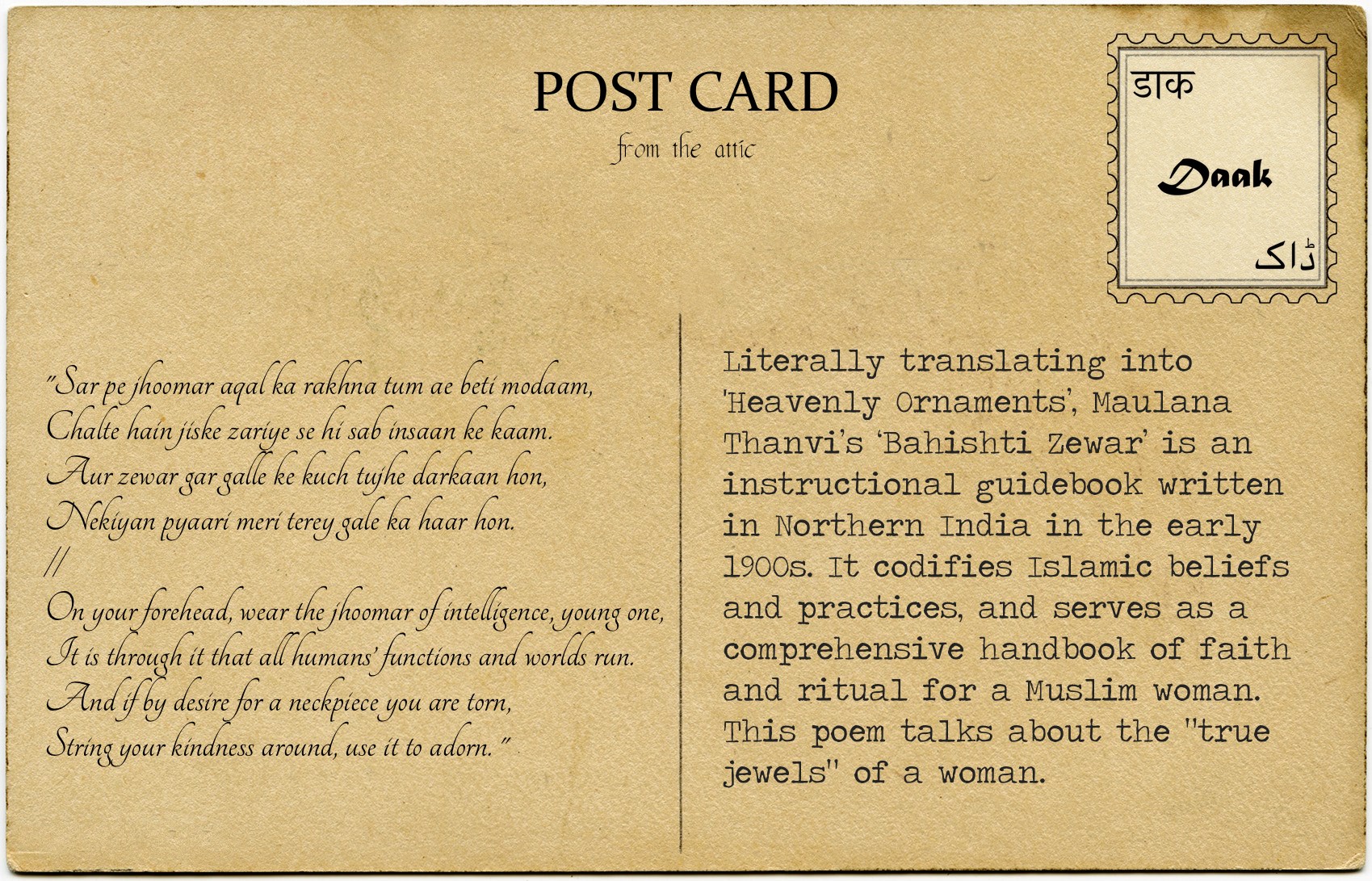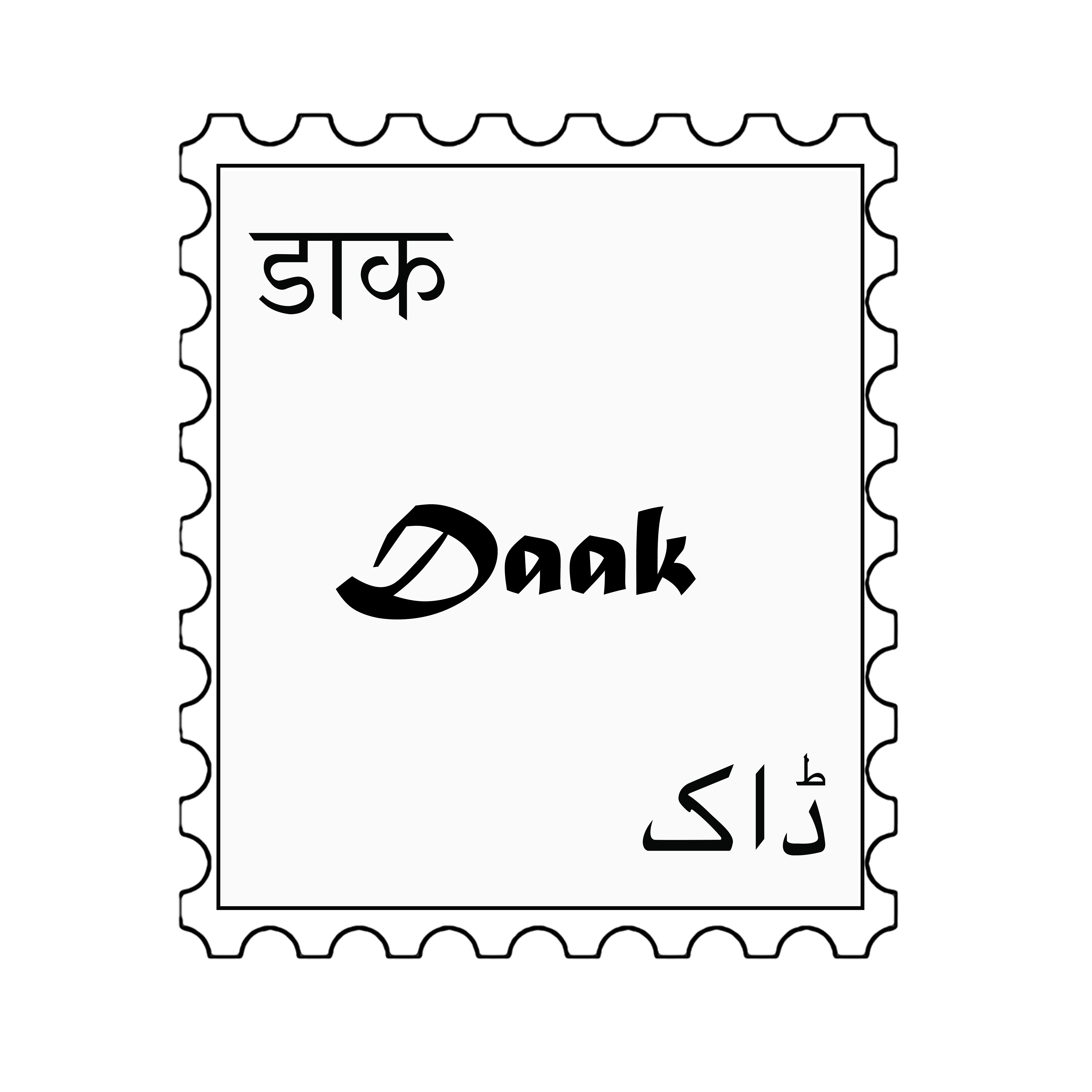
An Instructional Guidebook for Muslim Women: Maulana Thanvi’s Bahishti Zewar
Literally translating into ‘Heavenly Ornaments’, Maulana Thanvi’s ‘Bahishti Zewar’ is an instructional guidebook written in Northern India in the early 1900s. It codifies Islamic beliefs and practices, and serves as a comprehensive handbook of faith and ritual for a Muslim woman. The book, originally written in Urdu, has been translated into various languages and used by South Asians and South Asian diaspora for a long time. As common practice, many women were gifted a copy of the book on their wedding day so as to begin their initiation into womanhood and serve the purpose of their “social education”.
While one’s first instinct would be to dismiss it or label it prejudiced given its context (a privileged male writing social rules for women), one is taken by surprise on examining the contents. Translator Barbara Metcalf notes that “throughout the work, nothing is more striking than the extent to which the book takes women and men as essentially the same, in contrast to European works directed toward women at this time.”
The book gives detailed descriptions of everyday life in the privileged classes in North India and is an interesting source material to study Islamic social reform in the subcontinent. It is clear that Maulana Thanvi’s intent was to educate women and remove the ambiguity of hearsay when it came to rules and rights.
It also serves as an etiquette manual for the modern Muslim woman including guidelines on how to write letters (“khat likhne ka bayaan”) and address it to various people. It has a section on respect of elders, best practices on how to raise a child, deal with puberty, and socialize at parties (“mehfil”), among others. Instructions for following the righteous Islamic way are also broken down. You can refer to it lest you need to know how to perform ablutions, do charity in Ramadan, conduct the ritual slaughter on Eid, or even carry out proceedings of a marriage. And in case you were looking to pick up some handy tips, the book is abundantly stocked with manuals for everyday skills and home-remedies; these range from from cures to minor ailments, instructions on making soap, ink and tobacco, to embroidery patterns and block printing on fabric.
Our favourite, however, is a poem at the very beginning of the book, which we have translated below:
Jewels of Humanity
A girl asked this to her mother dear,
Tell me about jewels Ama, I am ignorant here.
Tell me what jewels are precious amongst these,
And which of these would be hideous, tell me please.
So I have the privilege to distinguish between the bad and the good,
And be bestowed with the secrets of your abundance, I should
The mother, with love, said to her daughter dear,
Listen carefully to what I say, with an open heart you hear.
The jewels of wire and gold are said to be precious,
But don’t, my life, ever get too enamored, be conscious.
The glistening of gold and silver is no good really,
Like four days of moonlit night and after darkness is all you see.
For you, you must covet adornments such,
That benefit the faith and humanity much.
On your forehead, wear the jhoomar of intelligence, young one
It is through it that all humans’ functions and worlds run,
The earrings on you in them should be wisdom,
So that advice worth lakhs into your ears they hum.
The voice of the advisor, or tips for matters of the heart,
If you apply these, may fate be your friend from the start.
Heavy earrings give ears nothing but trouble and pain,
Keep faith in your ears, from books you will gain,
And if by desire for a neckpiece you are torn,
String your kindness around, use it to adorn.
May the strength of your arms be your bracelet,
May success upon success, you constantly beget
All those adornments of the arms, they are useless really,
For us, your bare arms our daughter are the care necessary.
More beautiful than these adornments is the craft of the hands,
Craftsmanship is a talent envied across lands
What will you do, my life, with these anklets you are in,
They should be thrown, daughter, they are nothing but din.
The best adornment for feet, is enlightened foresight,
Stay steadfast, time after time, on the path of right.
If you lack the adornments of wire and gold on your feet, worry not my heart,
Be careful, so you may not falter from your path.
Asli insaani zewar
Ek ladki ne yeh poocha apni ama jaan se
Aap zewar ki karein tareef mujh anjaan se
Kaun se zewar hain ache ye jata dijye mujhe
Aur jo bad zeb hai wo bhi bata dijiye mujhe
Taaki ache aur bure mein mujh ko bhi ho imtiyaz
Aur mujh par aap ki barkat ka khul jaaye ye raaz
Yun kahan amma ne muhabbat se ki aye beti meri
Goshe dil se baat sun lo zewaron ki tum zari
Seem wazr ke zewaron ko log kehte hain bhala
Par na meri jaan hona tum kabhi in par fida
Sone chandi ki chamak bas dekhne ki baat hai
Char din ki chandni aur phir andheri raat hai
Tum ko lazim hai karo margoob aise zewrat
Din o duniya ko bhalai jis se ae jaan aai haath
Sar pe jhoomar aqal ka rakhna tum ae beti modaam
Chalte hain jiske zariye se hi sab insaan ke kaam
Baalian hon kaam mein ae jaan gosh hosh ki
Aur nasihat lakh tere jhumkon mein ho bhari
Aur aaweze nasayih hoon ki dil aawez hon
Gar kare in par amal tere nasebe tez hon
Kaan ke patte diya karte hain kaanon ko azaab
Kaan mein rakho nasihat deen jo auraq e kitab
Aur zewar gar galle ke kuch tujhe darkaan hon
Nekiyan pyaari meri terey gale ka haar hoon
Quwat e baazu ka haasil tujh ko baazu band ho
Kaamyaabi se sada tu kharam o kharsand ho
Hain jo sab baazoo ke zewar sab ke sab bekaar hain
Hamein baazo ki ae beti teri darkaaar hai
Haath ke zewar se pyaari dastkaari khoob hai
Dastkaari wo hunar hai sab ko jo marghoob hai
Kya karogi ae meri jaan zewar khalkhaal ko
Phenk dena chahiye beti bas is janjaal ko
Sab se acha paaon ka zewar ye hai noor basr
Tum raho sabit qadam kar waqt kar waqt rahe naik par
Seem o zar ka paon mein zewar na ho toh dar nahi
Raasti se paaon phisle gar na meri jaan kahin
Buy a copy of Metcalf’s translation here and a find a free PDF of the book in English here. If you’d like to venture into reading the original Urdu, you’ll be surprised to know that there are many apps for it: Click here.

Leave a Reply